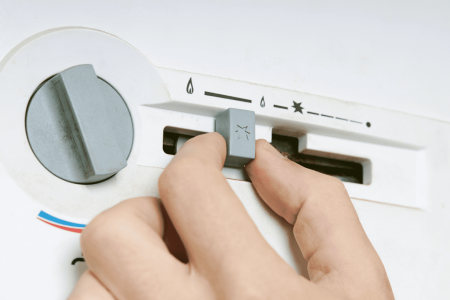A self-cleaning water heater is equipment designed to reduce the sediment build-up inside its tank. Unlike normal water heaters, where water sediment tends to build up on their bottom with the passage of time, self-cleaning water heaters use internal water circulation to flush out the unwanted materials.
Such kind of functionality comes handy in two ways.
First of all, a self-cleaning water heater helps prevent the sediments from taking up valuable space in the tank. Secondly, it protects you from the trouble of having to flush out the tank after every few weeks.
In this article, we are going to take a comprehensive look at the self-cleaning water heaters. We’ll also look at how self-cleaning water heaters work and what is the probable lifespan of these units. Finally, we’ll take a look at whether these types of heaters are worth your valuable investment in the long run.
How Do Self-cleaning Water Heaters Work?
Powered by gas or electricity, a self-cleaning water heater is designed to perform the same function as that of its standard counterpart. They might look exactly the same as that of normal water heaters, but the main difference comes in the form of a dip tube that is equipped with a special fitting.
Sediments enter into the tank with the normal cold water through the intake pipe. Once inside, they fall to the bottom of the tank that effectively reduces the heater’s efficiency. However, a dip tube keeps these unwanted materials swirling at the bottom, not allowing them to settle down on the surface.
Such kind of arrangement means that the next time you open the hot water tap, these materials will get sucked out on their own. As a result, you don’t have to worry about unwanted materials lying around in your water heater.
Some of the vital components of this equipment include an anode rod, an effective self-cleaning system, heat trap nipples and a drain valve. These components can vary, depending on the heater’s manufacturer, but their main function is all the same: to ensure a smooth functionality of this unit.
No products found.
Pros and Cons of Self-cleaning Water Heaters
Here are some of the advantages and disadvantages one need to consider before investing in a self-cleaning heating water.
Pros of Self-Cleaning Water Heaters
Energy Efficient
One reason why normal water heaters tend to consume more energy with the passage of time is due to the regular build-up of sediments. These materials can also accumulate on the heating element, meaning it has to use more energy for doing the same job.
However, there’s no such thing with self-cleaning water heaters. They remove most of these sediments on their own without allowing them to build up on their bottom. It thus saves your heating element from doing the extra work which, in turn, allows the heater to work optimally at all times.
This will lead to greater savings in your energy bill every month. It means that even though this equipment is expensive as compared to a standard water heater, this cost can be compensated by the fact that they’re energy efficient in the long run.
Ease of Maintenance
A normal water heater requires regular cleaning after every six months. It includes flushing your tank and removing the sediment build up with your own hands. All of this requires a regular cleaning schedule or otherwise, you might end up with layers of sediments in your water tank.
There is, on the other hand, no such worry with a self-cleaning water heater. This equipment uses internal water circulation to remove the sediment build-up which keeps it neat and clean without external help.
It means when you don’t have to worry about flushing out the tank after every few months, you can spend this time in other useful tasks.
Cons
Expensive
The self-cleaning water heaters are much expensive as compared to the normal water heaters. They are designed to do an additional task and that gets replicated in their asking price. So, if you’re a budget friendly person, investing in this equipment might poke a whole in your pocket.
Still Requires Some Maintenance
This isn’t a secret that even the best designed self-cleaning water heaters cannot remove all the sediments. There will be some unwanted materials left behind in these units that you have to cater on your own. So, you might have to flush them once every year for ensuring an optimal performance.
FAQs
Do I need to flush self-cleaning water heater?
Yes, you have to flush self-cleaning water heater. This is due to the fact that even though self-cleaning water heaters take care of a majority of sediments on their own, some are still left behind on the surface. These unwanted materials can affect the heater’s performance and longevity.
It is recommended to clean self-cleaning water heaters once every three years. Depending on the type of your heater, you can flush two to five gallons of water every time for ensuring optimal performance.
How long does a self-cleaning water heater last?
A self-cleaning water heater can last anywhere from 8 to twelve years. However, the heater may last longer if you use maintain it on a regular basis.
Is a self-cleaning water heater worth it?
It depends on you and your personal needs. A self-cleaning water heater can save you from worrying about its personal maintenance. It can have a noticeable effect on your energy bills, too. And this product can considerably reduce the amount of unwanted materials in your water content.
Having said that, a self-cleaning water heater is expensive compared to its standard counterpart. Purchasing this unit might not be a favorable option for budget friendly customers who don’t want to spend too heavily on this purchase.
Conclusion
Purchasing a self-cleaning water heater is a personal choice. Before making this purchase, answer the following questions: Are you comfortable with the asking price of this heat? What about the type, brand and other useful features?
This device will surely reduce the sediment content in your water. But it also comes with a sizable price tag that can be offset with the cut-offs in your electricity bill. Once you’re clear about these questions, you will be in a comfortable position about making this purchase.

I graduated with a degree in Chemical Engineering and have written for a number of nationally recognized publications in the home improvement space. My skills include fluid mechanics and process engineering and I have worked on numerous projects, including in waste water flow rate calculation and heat balance of steam rollers in the paper industry. My goal as a technical writer is to make complicated topics easy to understand for the average person.
